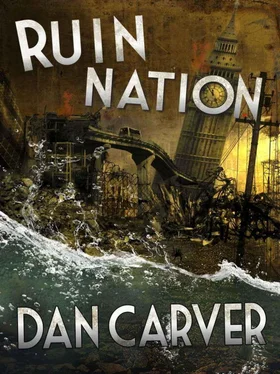Colchester had a varied and interesting history – right up to the point where it collapsed into the ocean. Prior to that, there were the famous rucks between the Romans and Boudicca’s Iceni tribe – characterised by butchery, sexual assaults and temple-burnings – and then, in the thirteenth century, it became popular with Flemish weavers.
Things hotted up a little during the first English Civil War when Cromwell’s boys besieged the city and starved it into submission. Attempts to frighten off the Parliamentarians with a bloody big cannon failed when it fell from the battlements, shattered and passed into legend as the ‘Humpty Dumpty’ from the nursery rhyme. “All the King’s horses and all the King’s men” couldn’t put it back together again. So the Royalists surrendered and the Roundheads shot ’em.
Fast forward a few hundred years and we find military chiefs building a major barracks here. Why? Because “higher than average levels of female promiscuity” ensure “a steady supply of the resources essential to a smooth-running military unit.”
And it’s for this same reason that Malmot chooses to refortify the walled city and the army compounds, reopen the nightclubs and turn Colchester into his base of operations.
Now you’ll have watched a few war films. You’ll know what these bases look like and the way they’re run. Well, take that basic notion and then wind the architecture back a couple of thousand years. Take away the barbwire fences and concrete and substitute colossal earthwork ramparts. Once you’re past the gates, you proceed up a deep trough into the main enclosure, a bowl-rimmed plateau of epic proportions atop what’s basically a Bronze Age hillfort. But hillfort doesn’t do the thing justice. It’s a mountainous structure, pockmarked with semi-buried buildings and crowned with the funnels and gutters of a complex water catchment system. There’s no electricity – the wind turbines have yet to be assembled – and the light comes via bonfire and flame torch, casting flickering shadows over black, hunchback vehicles. Now and again, something large and mean clanks past on steel tracks, engines roaring on rough-arsed biodiesel. Hordes of soldiers carry out incomprehensible duties. I hear barked orders, female laughing and male grunting.
Places like this don’t spring up overnight. They take years to plan and decades to build. God knows what it takes to keep them secret, but I’m sure it’s measured in lives. And God knows why Malmot requests my company on a midnight stroll of the perimeter – just me, him and two semiautomatic-toting soldiers in scowls and greatcoats.
“Are you an ambitious man?” Malmot asks me.
“ Quietly ambitious, Sir. I don’t like treading water but, equally, I don’t like to rock the boat.”
“What a nicely vague mishmash of metaphors, Jupiter. Clearly you know which side your bread’s buttered.”
“Yes, Sir.”
“And who’s baked it.”
“Er, yes, Sir.”
“But you’re not about to spread the jam, are you?”
“Spread the jam, Sir?” Feigning ignorance: where would I be without it?
“Spill the beans,” he persists.
But I’m not about to spill anything. I know the deal. It starts with secrets and ends with intestines. And to Malmot? Well, I’d rather slit myself open in a shark enclosure – for all the compassionate treatment I’d get.
“Ah, your hesitancy does you credit,” he says at last. “It’s a fool who talks about himself too readily. A great man has admirers to do so for him.”
I don’t ask him where he stands on the autobiographies of famous dictators, because, at this point in the proceedings, I’d no notion I’d end up as one. I just shuffle my feet a bit.
It’s a bitterly cold night. It’s not a fact worth remarking upon, but there’s an awkward silence and I need something anodyne to fill it. So the temperature gets mentioned and he turns to me with a funny look on his bony face.
“I often get the impression that what you’re saying is different from what you’re telling me.”
It’s an accurate enough observation. So I leave it to pass without comment.
“I, myself,” he continues, “I, myself, never discuss myself –except to state that my wisdom and benevolence is but a counterpoint to my intrinsic sense of place and purpose.” And he stops in his tracks to ask: “Is that clear?”
“As crystal, Sir,” I say, although I mean ‘mud’.
“A moment ago I asked about ambitions. I was wondering where you saw yourself in the scheme of things. Where you wanted to be. And how you saw yourself getting there. And whilst I have no doubt that you’d misuse power if given it, I don’t think you seek it in itself. Because I suspect that you resent it. Because, for all your amoral posturing, you have an innate sense of fair play and arbitrary authority goes against that.”
Am I being condemned or complimented? I wait for the summation.
“You see, I like to get the measure of my employees and there’s something of the perpetual dissenter about you, Jupiter.”
“I wouldn’t know, Sir.”
“I think you do. I think you do know but you’re not letting on. You’re disturbingly well behaved for an artist and that’s not usual. It worries me. I can see the anger seething beneath the surface, but it’s not going anywhere productive. Or even destructive .”
“I did hang someone, Sir.”
“But you didn’t enjoy it.”
“I, er, might have , Sir.”
“No, Jupiter, you’re lying. Calamari was there and he says you seemed pretty indifferent to the whole business. So where is all this boiling rage going to, I wondered, what’s he channelling it all into?”
“I’m luke-warm on cats, Sir.”
“No, that’s not it.”
“I dislike touching other people’s shoes.”
“No, no, no. Stop toying with me. I know you’re your problem is, boy, and it’s God. You hate God. You want to destroy Him.”
“I, er… Well…” I stammer. But what can you say when someone’s sussed your most degenerate desire? “Er… It’s an idea that had…”
“Had occurred to you at some point. I understand. You’re trying to phrase it in a manner that doesn’t make you sound like a complete lunatic.”
“Er…”
“And you’re wondering how I know. After all, it’s not the kind of thing you let slip in common conversation.”
“It had crossed my mind, Sir.”
“Well, it’s simple really. You see, you talk in your sleep. And I have a woman who writes it down.”
“But?”
“Like Calamari said, we’ve had unpleasant things implanted under your skin. We record your every utterance, Jupiter. Which is how we know about your little chats with Calamine.”
“Oh.” Is that the bottom falling out of my world or the world falling out of my bottom?
“Yes. Oh, indeed . But let’s not worry about Calamine for now. It suits my purpose to leave him at his liberty. But this killing God business…”
Well, if he’s expecting me to elaborate unprompted, he’ll be in for a very long wait. And it’s some time and an awful lot of awkward silence before he takes up the reins again:
“You’ve offloaded all responsibility for your actions on God and now you’re so busy plotting some childish form of revenge you’ve forgotten to engage with your day to day existence. You behave, not because you chose to, but because you’ve exhausted your anger screaming at the heavens.”
I suppose he’s half-right. The half-wrong bit he’ll learn about later. But why am I so prevalent in his thoughts?
He attempts a friendly tone when remarking:
“Certainly knocks the old Oedipus complex into a cocked hat, doesn’t it?! Killing God, I mean. There must be a name for it?”
Читать дальше












